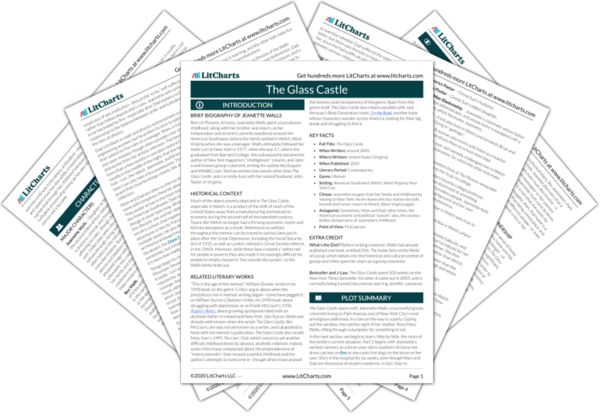To whom and to what should one be responsible? While Mom and Dad clearly shirk much of their responsibility as parents, the book reveals that they are actually acting in accordance with their non-conformist beliefs—which they see as a higher responsibility. In some cases, the book equates responsibility with self-sufficiency, as Mom and Dad encourage Jeannette and her siblings to look out for themselves rather than rely on anyone else. On the other hand, her parents take pride in their willingness to live outside the “system,” pledging responsibility to an ideal rather than to specific people, and the result of this insistence on radical self-sufficiency can be seen as a profound lack of responsibility, such as teaching children to swim by throwing them in the water, refusing to take sick children to the doctor. In contrast, the adult Jeannette struggles with whether her instinct to ignore or lie about her “embarrassing” family represents a lack of moral responsibility—Jeanette senses that she has a responsibility founded in her direct relationship to her parents, rather than responsibility based on an abstract ideal.
In either case, The Glass Castle suggests that it is possible to both take responsibility for one’s own actions, and understand how these actions can stem from deeper, more systemic issues. Jeannette ultimately chooses a more material and less idealistic notion of responsibility than her parents, but she also continues to try to understand why they seem unable to take responsibility for their own actions, or to what they do feel responsible that makes them act the way they do.
Responsibility, Self-Sufficiency, and Non-Conformity ThemeTracker

Responsibility, Self-Sufficiency, and Non-Conformity Quotes in The Glass Castle
“You want to help me change my life?” Mom asked. “I’m fine. You’re the one who needs help. Your values are all confused.”

Unlock explanations and citation info for this and every other The Glass Castle quote.
Plus so much more...
Get LitCharts A+Dad kept telling me that he loved me, that he never would have let me drown, but you can’t cling to the side your whole life, that one lesson every parent needs to teach a child is “If you don’t want to sink, you better figure out how to swim.”
“I swear, honey, there are times when I think you’re the only one around who still has faith in me,” [Dad] said. “I don’t know what I’d do if you ever lost it.” I told him that I would never lose faith in him. And I promised myself I never would.
“I wonder what life will be like now,” I said to Lori.
“The same,” she said. “[Dad] tried stopping before, but it never lasted.”
“This time it will.”
“How do you know?”
“It’s his present to me.”
“Erma can’t let go of her misery,” Mom said. “It’s all she knows.” She added that you should never hate anyone, even your worst enemies. “Everyone has something good about them,” she said. “You have to find the redeeming quality and love the person for that.”
She was keeping [the wedding ring], she explained, to replace the wedding ring her mother had given her, the one Dad had pawned shortly after they got married.
“But Mom,” I said, “that ring could get us a lot of food.”
“That’s true,” Mom said, “but it could also improve my self-esteem. And at times like these, self-esteem is even more vital than food.”
I had always wanted a watch. Unlike diamonds, watches were practical. They were for people on the run, people with appointments to keep and schedules to meet. That was the kind of person I wanted to be.
“Why do I always have to be the one who earns the money?” Mom asked. “You have a job. You can earn money. Lori can earn money, too. I’ve got more important things to do.”
“Who do you think you are?” [Dad] asked. “She’s your mother.”
“Then why doesn’t she act like one?” I looked at Dad for what felt like a very long moment. Then I blurted out, “And why don’t you act like a dad?”
“You can’t just live like this,” I said.
“Why not?” Mom said. “Being homeless is an adventure.”
“I think that maybe sometimes people get the lives they want.”
“Are you saying homeless people want to live on the street?” Professor Fuchs asked. “Are you saying they don’t want warm beds and roofs over their heads?”
“Not exactly, I said. I was fumbling for words. “They do. But if some of them were willing to work hard and make compromises, they might not have ideal lives, but they could make ends meet.”
Professor Fuchs walked around from behind her lectern. “What do you know about the lives of the underprivileged?” she asked. She was practically trembling with agitation. “What do you know about the hardships and obstacles that the underclass faces?”
“Hey,” [Dad] said. He winked and pointed his finger at me “Have I ever let you down?”
He started chuckling because he knew there was only one way I could ever answer that question. I just smiled. And then I closed the door.
“Grandma Walls is different from your other grandma,” I told [Veronica].
“Way different,” Veronica said.
John’s daughter, Jessica, turned to me and said, “But she laughs just like you do.”











